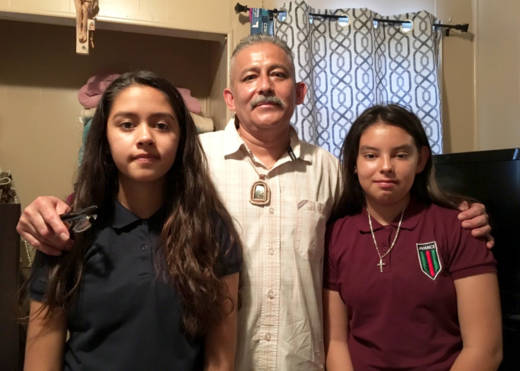“After six months of being separated from my family, feeling the warmth of my family, I’m very happy,” he said. “Thank God.”
Avelica-Gonzalez had just dropped off one of his daughters at her school in Highland Park in February when U.S. Immigration and Customs Enforcement agents stopped him a few blocks away and arrested him. Another of his daughters videotaped the arrest, crying as she did so, and the video took off on social media.
Immigrant advocates viewed his case as heralding a return to a more aggressive immigration enforcement under President Trump. During the Obama administration, immigration agents focused largely on those with serious criminal records.
Avelica-Gonzalez had two minor convictions, a 2008 DUI and a 19-year-old conviction for receiving stolen property, a vehicle registration sticker that was not legally his. Both convictions made him deportable, but were set aside by a judge earlier this year.
Then earlier this month, the federal Board of Immigration Appeals vacated the deportation order against him and sent his case back to the Los Angeles immigration court to be reconsidered.
Meantime, the bond decision allowed him to return home.
Avelica-Gonzalez said Thursday that the past six months were tough. He suffers from diabetes, which he was treated for but which he said worsened while he was in custody.
“The medical attention there takes a long time, they don’t pay enough attention, to tell the truth,” he said. “Sometimes I felt really sick. Only when they see that you are really sick, that you’re lying on the floor, that is when they pay attention to you.”
There were times that deportation to Mexico seemed imminent. But Avelica-Gonzalez said he never lost faith that he’d be reunited with his family.
“I never lost hope, I never lost faith that I would be with my family because of all they were doing for me, how they were fighting for me,” he said.
The arrest video that drew attention to his case was taken by his daughter Fatima, 13 at the time. She and her siblings continued pushing for her father’s release, aided by immigrant advocates.
“I went to Washington, D.C., I talked to congressmen, I went to Sacramento and I talked to the governor,” said Fatima Avelica, now 14. “We did a lot of stuff.”
Now that she has her dad back at home, “I feel very happy,” Fatima said. “The past six months have been very difficult for me and my family…now that I have him back with me, it’s very exciting.”
Avelica-Gonzalez said he hopes to be able to stay in the country legally and obtain a work permit. He and his wife, Norma Avelica, are seeking permanent legal status.
Immigration officials said they could not comment on his case.
